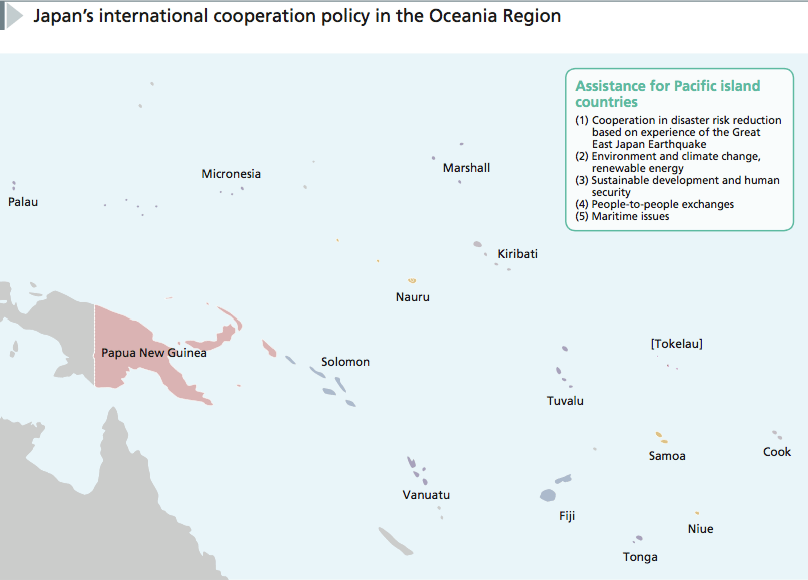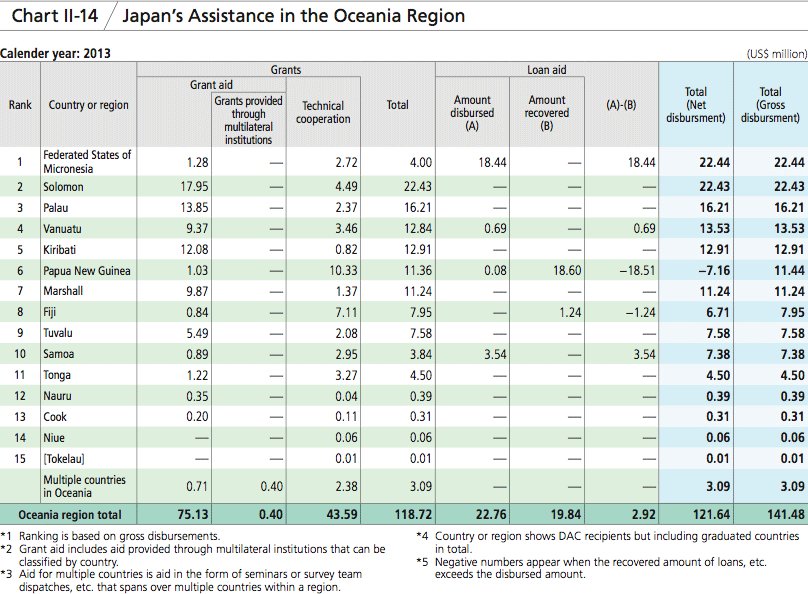7. Oceania
The Pacific island countries are Japan's neighbors that not only share the Pacific Ocean, but also have historical ties to Japan. Having an enormous Exclusive Economic Zone (EEZ), these countries and regions are the cornerstone of Japan's maritime transport, and they provide important deep-sea fishing grounds for us. Therefore, the peace and prosperity of the Pacific island countries are extremely important to Japan.
Meanwhile, many of the Pacific island countries are newly independent states, and it is urgently necessary for them to establish economically self-reliant nations. In addition, there are common problems, such as small-sized economies depending on primary industries, broadly stretched territories, difficult access to the international market, vulnerability to natural disasters, and the risk of land loss because of rising sea-levels. There are also such challenges as those faced by Fiji, which has been promoting efforts towards democratization. Japan aims to be a good partner to the Pacific island countries, and to provide assistance that addresses the challenges faced by each country and region such as those described above.
< Japan's Efforts >
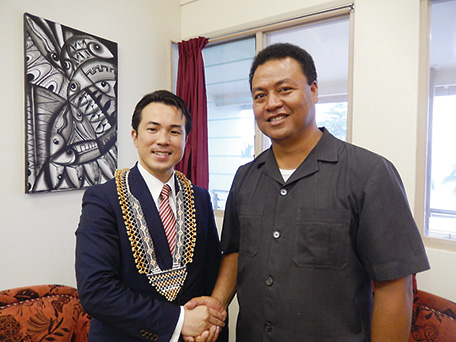
Parliamentary Vice-Minister for Foreign Affairs Takashi Uto shaking hands with Minister for Foreign Affairs and External Trade of Solomon, Mr. Clay Forau Soalaoi, during his visit to Solomon in September 2014.
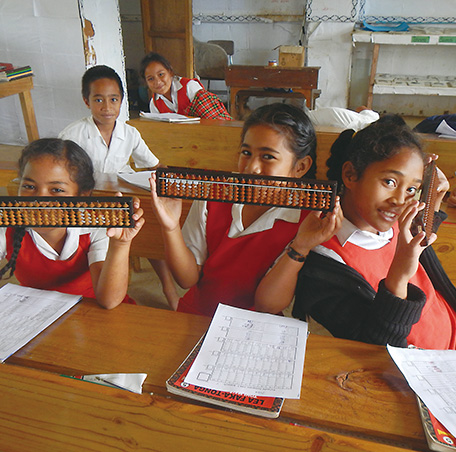
Children in Tonga pausing for photograph with abacus. (See “Stories from the field” column, “The Japanese abacus and the children of an island country”) (Photo: Yuka Nagaoka)
To achieve political stability and self-reliant economic development in the Pacific island countries, it is crucial to overcome socio-economic vulnerabilities and to provide cooperation for the entire region. In addition to promoting cooperation with the Pacific Islands Forum (PIF)(Note 7), a framework for regional cooperation composed of the Pacific island countries, Japan holds the Pacific Islands Leaders Meeting (PALM), the summit meeting between Japan and Pacific island countries, held once every three years since 1997.
The Sixth Pacific Islands Leaders Meeting (PALM6) was held in Nago City, Okinawa in May 2012, under the theme “We are Islanders - For Growing ‘Kizuna' in the Pacific.” At PALM6, Japan committed to making maximum efforts to provide the assistance of up to $500 million over the next three years in order to promote cooperation, which comprises the following five pillars: (i) response to natural disasters, (ii) environment and climate change, (iii) sustainable development and human security, (iv) people-to-people exchanges, and (v) maritime issues. Under one of these five pillars, “response to natural disasters,” Japan intends to share lessons learned from the Great East Japan Earthquake and tsunami, and to cooperate with the improvement of the Pacific Tsunami Warning and Mitigation System.
Furthermore, at the 2nd PALM Ministerial Interim Meeting held in October 2013, the participants discussed how the outcome of PALM6 should be followed-up on, the preparation of the next summit, other common challenges faced by the Pacific island countries and the way forward for their cooperation. The Pacific island countries and regions have challenges in the areas of the environment and climate change, education and health. In order to promote the sustainable development of these countries, Japan provides cooperation not only for each country, but also for regional cooperation that is beneficial to the entire Pacific region.
For example, in order to improve the capacity of disaster management of Pacific island countries and regions that are vulnerable to the impact of climate change and prone to natural disasters, Japan assists them in developing systems which allow people to evacuate properly. Furthermore, Japan works with the Secretariat of the Pacific Regional Environment Programme (SPREP), a regional organization located in Samoa, to support the formulation of the national solid waste management strategy of each country and human resources development in the area of waste management.
- Note 7: PIF member countries/regions: Australia, New Zealand, Papua New Guinea, Fiji, Samoa, Solomon, Vanuatu, Tonga, Nauru, Kiribati, Tuvalu, Micronesia, Marshall, Palau, Cook, Niue
| Papua New Guinea
The Project for Improvement of Road Maintenance Equipment, the Project for Capacity Development on Road Maintenance
Grant Aid, Technical Cooperation Project (November 2013 – Ongoing)
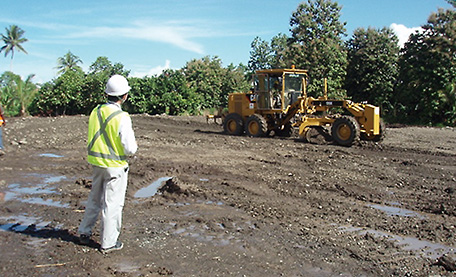
Transfer of techniques to the staff of the Department of Works is carried out while actually conducting road maintenance work by using the provided construction machine. (Photo: Yasuo Nakata / Ingerosec Corporation)
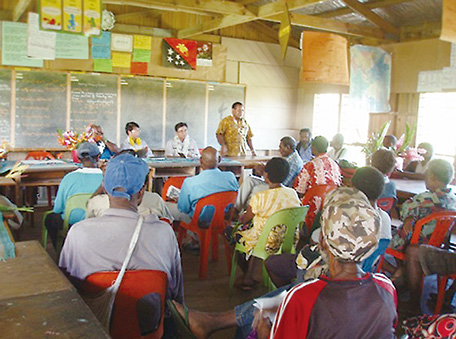
Public consultation for the local community before the start of the pilot project. The residents of surrounding areas have great expectation on the pilot project that will be implemented for unpaved roads in rural areas. (Photo: Yasuo Nakata / Ingerosec Corporation)
Papua New Guinea has a national highway network spanning approximately 8,700 km in total, 64% of which is gravel, unpaved roads. Due to inadequate road maintenance, 90% of the roads, particularly in rural areas, are left in poor condition. In addition, roads are severed by steep geographical features, as well as landslides and flooding that occur all over the country in the rainy season.
To improve this situation, Japan addressed the issues of the lack and aging of road maintenance equipment by providing the required equipment to four provinces (Morobe Province, Western Highlands Province, East Sepik Province, and West New Britain Province) through the grant aid project, “the Project for Improvement of Road Maintenance Equipment.” In conjunction with this project, the technical cooperation project, “the Project for Capacity Development on Road Maintenance,” was implemented to address another issue, the capacity building of the personnel of the Department of Works of Papua New Guinea. This project provided training on the operation and maintenance of the equipment Japan supplied, among other supports. Japan extends comprehensive support to enable Papua New Guinea to appropriately maintain unpaved roads and carry out disaster prevention measures.
The project will contribute to improving the road maintenance capacity of the Department of Works of Papua New Guinea. This is expected to give people in rural areas easier access to social services, including education and healthcare, and lower the cost of transporting agricultural products from the production area to the consumption area, and thereby, increase opportunities for people living in isolated areas to raise their incomes.
(As of August 2014)
| Fiji, Solomon
The Project for Strengthening Community-based Disaster Risk Management
Technical Cooperation Project (October 2010 – October 2013)
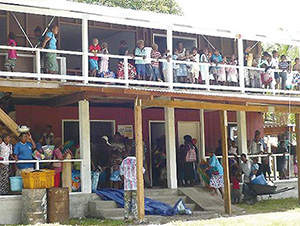
The finished shelter has a 120 person capacity. There are two water tanks to ensure drinking and domestic water is available. (Solomon) (Photo: JICA)
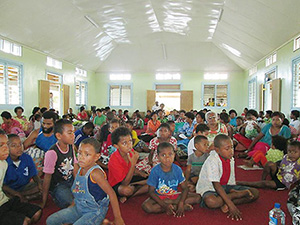
Emergency drill conducted in Nawaqarua Village (Fiji) (Photo: JICA)
The territories of the Pacific island countries tend to be scattered, and they are vulnerable to natural disasters such as typhoons, earthquakes, tsunamis and volcano eruptions. In this region, it is not always easy to communicate or transport goods between the main islands and remote islands, let alone between cities and villages. For this reason, disaster information did not reach the residents in a rapid and accurate manner, and it was also difficult to provide emergency assistance after the occurrence of disasters. Fiji and Solomon were no exceptions.
This project provided support for strengthening disaster risk reduction capacity in Fiji and Solomon both at the central government and community levels. Water gauges and rain gauges were installed at the Meteorological Service of both countries, Water Authority of Fiji, and Water Resources Division (Solomon) to strengthen the capacity on flood forecast, such as collecting meteorological data for flood forecast and analyzing data when floods occur. In addition, the project strengthened the communication structure to deliver disaster/evacuation information (warning) issued by the Meteorological Service, Water Authority and Water Resources Division to the National Disaster Management Office and communities promptly. Furthermore, in order to develop a community-based system for disaster risk reduction planning, the project provided support for both material and non-material infrastructure, including installation of simple rain gauges, creation of hazard maps, promotion of disaster risk reduction awareness for residents, and conducting emergency drills.
Other initiatives Japan promotes in the Pacific island countries include support for building a natural disaster-resilient society and improvement of weather observation capacity and earthquake/tsunami forecast capacity, and strengthening early warning systems. Through such comprehensive support, Japan aims to contribute to building a disaster-resilient society. Japan continues to provide support to make further contribution for disaster risk reduction in the region.
